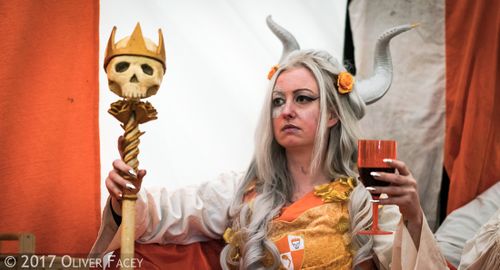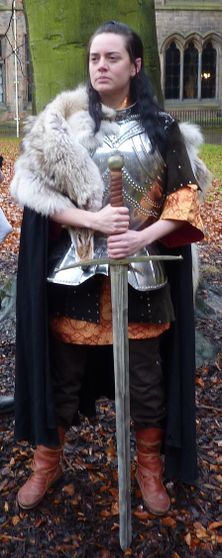Earl
(made enchanter a category) |
mNo edit summary |
||
| (49 intermediate revisions by 8 users not shown) | |||
| Line 1: | Line 1: | ||
{{ | {{CaptionedImage|file=Earl2.jpg|align=left|width=222|caption=Costume: model's own}} | ||
==Overview== | |||
An earl is the leader of a Dawnish [[noble house]]. The title is used for people of any gender. Each noble house appoints an earl, to lead the house. Being the earl is an inherently political position; the character is not expected to undertake the kind of glorious actions appropriate for a Dawnish noble - instead their time and energies should be devoted to ensuring that the other members of their house have every possible help to act. In this way the glory of the house is ensured and it is this glory that reflects in turn upon the earl themselves. | |||
==Setting Tests== | |||
One of the most important jobs of the earl is to setting Tests of [[Dawn Culture and Customs#The Test of Mettle|Mettle]], [[Dawn Culture and Customs#The Test of Ardour|Ardour]] and [[Dawn Culture and Customs#The Test of Resolve|Resolve]]. We have created a game design page especially to provide guidance on [[setting a test]]. | |||
==Enchanters== | |||
An earl who possesses magical powers may style themselves an enchanter or enchantress. With the resources of an entire noble house to back them up, Enchanters can exert a great deal of influence over the nation. Sometimes an earl becomes an enchanter later in life, studying magic as a means to expand their personal power. | |||
{{CaptionedImage|file=Sceptre.jpg|width=500|caption=Personal magical might wedded to significant political power defines the most potent enchanters and enchantresses.|align=right}} | |||
Most enchanters possess at least a basic mastery of ritual magic, focusing on the magic of the [[Summer]] realm (which grants strength to them and their troops) and the [[Autumn]] realm (which deals with prosperity and influence). The primary weakness of ritual magic from the point of view of an enchanter is that it is most powerful when supported by a group of ritual magicians, and Dawnish noble houses tend to shy away from this practice in favour of the more glorious battlefield incantations. | |||
Perhaps most importantly, an enchanter is in a good position to deal with the [[eternal|eternals]] on a more-or-less equal footing. Enchanters often pursue relationships with Summer eternals, who respect the personal power of a mighty individual more than they do the more diffuse power of a ritual group or lesser magician. | |||
[[Category:Dawn]] | [[Category:Dawn]] | ||
[[Category: | [[Category:Archetype]] | ||
Latest revision as of 19:50, 15 January 2026
Overview
An earl is the leader of a Dawnish noble house. The title is used for people of any gender. Each noble house appoints an earl, to lead the house. Being the earl is an inherently political position; the character is not expected to undertake the kind of glorious actions appropriate for a Dawnish noble - instead their time and energies should be devoted to ensuring that the other members of their house have every possible help to act. In this way the glory of the house is ensured and it is this glory that reflects in turn upon the earl themselves.
Setting Tests
One of the most important jobs of the earl is to setting Tests of Mettle, Ardour and Resolve. We have created a game design page especially to provide guidance on setting a test.
Enchanters
An earl who possesses magical powers may style themselves an enchanter or enchantress. With the resources of an entire noble house to back them up, Enchanters can exert a great deal of influence over the nation. Sometimes an earl becomes an enchanter later in life, studying magic as a means to expand their personal power.

Most enchanters possess at least a basic mastery of ritual magic, focusing on the magic of the Summer realm (which grants strength to them and their troops) and the Autumn realm (which deals with prosperity and influence). The primary weakness of ritual magic from the point of view of an enchanter is that it is most powerful when supported by a group of ritual magicians, and Dawnish noble houses tend to shy away from this practice in favour of the more glorious battlefield incantations.
Perhaps most importantly, an enchanter is in a good position to deal with the eternals on a more-or-less equal footing. Enchanters often pursue relationships with Summer eternals, who respect the personal power of a mighty individual more than they do the more diffuse power of a ritual group or lesser magician.
